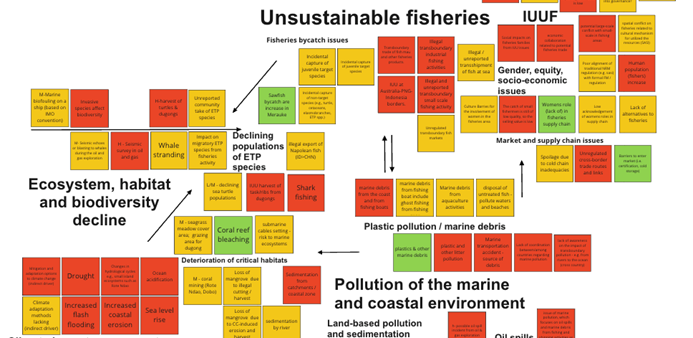In support of the ongoing updating of the Transboundary Diagnostic Analysis (TDA) for the Arafura and Timor Seas (ATS) region, a series of Causal Chain Analysis (CCA) workshops was organised by the ATSEA-2 Project in September 2022. By establishing cause and effect for priority transboundary issues, these workshops will subsequently inform policy responses and ongoing updates to the regional Strategic Action Program (SAP).
Facilitated by the Regional TDA Consultant, Matthew Fox, a total of five workshops were held virtually (on 1, 8, 15, 22 and 29 September 2022) with members of the TDA-SAP Regional Working Group (RWG), representatives of the National Working Groups (NWGs), National Project Directors, National Coordination Units and National TDA Consultants for Indonesia, Papua New Guinea (PNG) and Timor-Leste, and the ATSEA-2 Regional Project Management Unit, led by Dr. Handoko Adi Susanto, ATSEA-2 Regional Project Manager.
Considering inputs from country-level consultations and synthesis reports, ATSEA-2 regional thematic reports, external published sources and the definition of a transboundary environmental issue as an issue originating from the marine jurisdiction of one or more ATS countries and impacting on the waters of one or more other ATS countries, the workshops agreed on three priority transboundary environmental issue groupings:
- Pollution of marine and coastal environments
- Ecosystem, habitat and biodiversity decline
- Unsustainable fisheries
Through the CCA workshops, the group identified root causes, indirect drivers, direct drivers and the socio-economic and ecological impacts for the three priority issues identified for the ATS. Across the three issues, several common root causes were identified, including the impacts of climate change, population growth in the ATS region, tourism growth in the ATS region and global demand for seafood.

The following cross-cutting concerns also emerged from the TDA process: 1) the issue of anthropogenic climate change, which is already a significant driver (both direct and indirect) of transboundary problems – the influence of which will continue to increase in coming decades; 2) gender equity and social exclusion issues, which are likely to be exacerbated by climate change – both in terms of the way impacts are felt and the burden of adapting to them; and 3) ineffective governance, insufficient resources for management and ineffective coordination in addressing transboundary environmental issues within the region. These will need to be systematically addressed in the development of responses to the priority transboundary issues.
Significant changes were also observed by participants since the first TDA was developed for the ATS in 2011, including: the emergence of a new transboundary demand for fish maw (swim bladder); the expansion of some land-based activities in eastern Indonesia, including oil palm plantations; an increase in oil/gas exploration activities in the ATS (including seismic testing); and an increase in issues related to sewage, sanitation and plastic waste in coastal settlements, partly driven by tourism.
At the same time, the evidence base and monitoring frameworks for many aspects – including fisheries production, biodiversity, IUUF, socio-economic and cultural factors, and climate change impacts – has steadily developed, to the extent that trends may now be more perceptible than they were at the time of the development of the initial TDA and SAP. These issues will be explored in more detail in the process of developing the updated TDA.
The results of the CCA workshops were consolidated into the Causal Chain Analysis Report, which was reviewed by the RWG and the ATSEA-2 National Focal Point for Australia prior to its presentation at the ATSEA-2 4th Regional Steering Committee (RSC) meeting, held from 2–3 November 2022. Indonesia, PNG and Timor-Leste endorsed the three priority transboundary environmental issues in order to facilitate initiation of the drafting of the full updated TDA report, while Australia will require more time to undertake in-country consultations on the transboundary issues identified in the CCA report.
The 4th RSC also endorsed the proposed roadmap and timeline for completing the TDA updating process, which includes preparation of the draft updated ATS TDA and dissemination to the NWG and RWG members for review in national and regional TDA validation workshops, to be conducted from the last week of November 2022 to February 2023, after which a refined version of the document will be submitted to the RSC for final review to enable the completion of the updated ATS TDA before the end of March 2023.
By Cristine Ingrid Narcise


